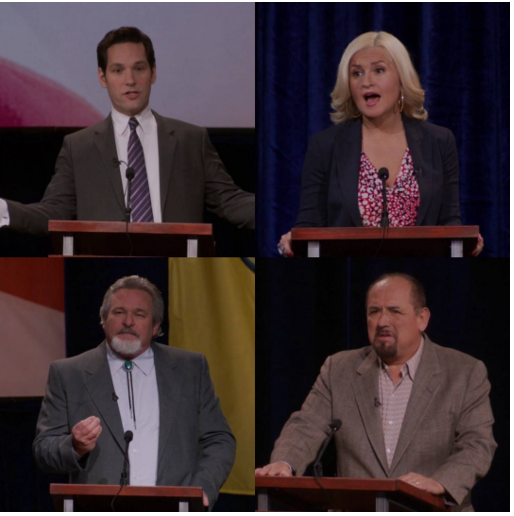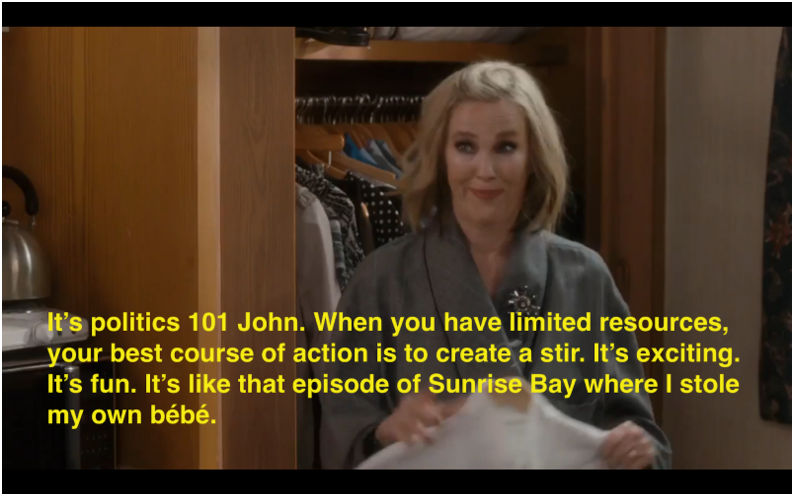U.S. Politics: As Seen on TV (from your fellow sitcom fans)
Thoughts | Catherina Jiang and Elysia Chau
Graphic by Jenny Chen
Disclaimer: the views and opinions expressed in this article are of the authors so they are not politically neutral. Both authors made every effort to ensure the information they presented was accurate, though they welcome comments and corrections. Ultimately, as the Howl Magazine, we respect all political viewpoints.
It’s hard to ignore how ridiculous recent U.S. politics has become, from child-like debates to a criminal being voted into office. It almost seems comedically familiar, like something out of a sitcom. After going back and bingeing our favourite TV shows, we noticed that, in many ways, these episodes are being realized in our frightening political reality. We’ve put together our top sitcom moments paralleled with recent political facts and events, begging the question: Will things resolve like a well-written storyline, or is our worst nightmare coming to life?
Out-of-Pocket Claims: Parks and Recreation
A perfect embodiment of America’s politics, Parks and Recreation is a satire situated in the fictional town of Pawnee, Indiana, capturing the life of Leslie Knope and the Parks and Recreation department. During Leslie’s campaign for city councillor against widely-admired nepo-baby Bobby Newport, she faces Jen Barkley, a well-accomplished campaign manager whom the Newports have hired to help Bobby win. According to Barkley, the best way to do so is by trashing the opponent with extreme accusations.
Donald Trump made a similar remark in the presidential debate, claiming the immigrants in Springfield, Ohio are “eating the dogs”. Though humorous, there is a lack of professionalism in these groundless, out-of-pocket comments; politicians like Trump aim to villainize others, but in the process, they ridicule themselves, making themselves look immature. Why waste your time making these claims when you could instead establish credibility in yourself and your policies? But unless you lack such ethos like Bobby…we’ll get to that next.
Season 4, Episode 19: Live Ammo
Low-Quality Candidates: Parks and Recreation
In the city council debate, Leslie is against four other candidates. They’re all passionate about leadership but only to pursue their personal interests. The most threatening candidate of the four is Bobby, as his family leads the town’s largest confectionery company, but he himself is not fully sure what he wants to achieve as city councillor.
These are the types of people that commonly run for office today. The idea of political power attracts those with ulterior interests, often for personal gain. The result is a campaign for a lower-quality candidate with little knowledge of the policies and relevant issues of the locality they should be representing.
The worst part is that the people’s standard for a political representative has lowered, and you can tell based on this clip. When Bobby Newport gives the most vague non-answer about his thoughts on abortion, or when another candidate, Fester Trim, expresses his apathy for the topic, both responses are tolerated. Newport is so well-liked by the audience that he receives praise for every answer he provides, despite his only goal as a councillor being to impress his father. Unfortunately, our reality involves political figures making self-serving promises, while showing a lack of interest in actual matters, and many of our peers are easily moved by such behaviours.
Season 4, Episode 20: The Debate
The Growing Use of Social Media: Brooklyn Nine-Nine
The increasing use of social media has drastically changed the scope of politics. This idea popped up in an episode of beloved American police sitcom Brooklyn-Nine Nine. During the precinct’s robotic, yet lovable, Captain Raymond Holt’s campaign to run for commissioner of the NYPD, he realizes that a competing candidate is gaining popularity from a tweet. Gina and Terry manage to convince a doubtful and naive Captain that whether we like it or not, social media is changing the way we communicate.
Campaigning via social media has escalated in this year's presidential election. Kamala HQ, the voice of Kamala Harris’ campaign on TikTok, took advantage of circulating trends to promote her candidacy, address crucial topics and issues (often with humor), and gain popularity.
Season 5, Episode 18: Gray Star Mutual
The Lack of Diverse Perspectives: Brooklyn Nine-Nine
Another iconic moment from B99: Captain Holt scoping out his competition! Throughout his journey to become commissioner and implement department-wide changes, he learns that his fellow candidates lack diversity in both their backgrounds and ideas for the NYPD.
Many problems the U.S. faces will never improve if we lack diverse perspectives from those in charge of policymaking. People of colour are almost always underrepresented in positions of power, with a disappointing lack of diversity in congressional staff (who make decisions that affect all Americans!) being especially concerning.
Season 5, Episode 15: The Puzzle Master
The Continuing Prevalence of Prejudice: Brooklyn Nine-Nine
A not-so-happy moment during Captain Holt’s campaign is when he realizes a fellow candidate, the only woman, was only nominated for “PR purposes”. Despite her valid ideas and efforts, she was simply not heard due to her identity.
Does anyone else feel that women have to work twice as hard for their ideas to be respected? Throughout her campaign, Harris’ speeches were full of substance and eloquently delivered, with her intelligent and persuasive character shining through. Meanwhile, her opponent, Donald Trump, has clearly struggled to articulate his ideas, being rude, careless, and awkward in how he presents himself. Truthfully, it shouldn’t even be a competition… yet we see Harris held to a much higher standard than her Republican counterpart.
Season 5, Episode 15: The Puzzle Master
For an overview of Holt’s journey, check out this clip!
Style Over Substance: Community
Community, a sitcom following the eccentric lives of community college students, also explores an election plot where the main character, Jeff, decides to run for student president to spite his classmate Annie, a keen and eager student with genuine ideas to improve the school. Jeff manages to sway voters by pleasing the crowd with vapid slogans. Despite having no real ideas, he gains popularity solely through his outgoing and charming persona.
Season 2, Episode 17: Intro to Political Science
While this is frustrating to the Annies of the world, the way in which candidates are perceived plays an enormous role in politics. Voters’ attention is limited, and the actual content being conveyed is only half the battle. A similar effect can be seen in Trump himself; from afar, he has the demeanor of a typical, sweet-talking politician. However, under closer inspection, his words can be shockingly absurd, and often surreal.
Distortion of Priority: Community
What about Annie? Hers was the only campaign with rational goals, like promising to advocate for student needs and cleaning the school of toxic mold. The truth is, as paralleled in the recent presidential election, no matter how pressing they may be, some goals are not what voters are attracted to. As the show ironically depicts, the priorities of many voters appear distorted. For example, Kamala’s platform to protect reproductive rights and improve access to healthcare (as well as avoiding a racist and sexist criminal leading the country) may not appeal when all one can focus on is the promise of a reduced tax rate.
Season 2, Episode 17: Intro to Political Science
Dirty Politics: Schitt’s Creek
Canadian sitcom Schitt’s Creek follows the formerly rich Rose family as they are stripped of their wealth and forced to live in a rural small town. Moira Rose, the family’s dramatic matriarch, runs for town council to make change after facing frustrations in her small-town experience. One memorable moment of her campaign: Moira stealing her own lawn signs. Why? To create a scandal of course!
While this seems utterly immoral, Moira may be onto something. Is it possible that all of Trump's scandals in the past few years, from fraud to tax evasion, brought more attention to his name, possibly earning him votes? As the saying goes — all publicity is good publicity. We even have the historical example of popular actor Ronald Reagan’s two terms in office.
Season 2, Episode 12: Lawn Signs
The déja-vus between sitcoms and reality highlight the shifting standards and values of politics. Through the use of both generic and satirical comedy, sitcoms aim to poke fun at contemporary political events by exaggerating them. But when these very moments come to life, they raise concerns about the nature of politics: Has it changed for better or worse? Our only confirmation is that the increasing similarities between exaggerated plots and reality promote the trivialization of American politics, leaving the country with policies that may make or break its future. In the meantime, these sitcom parallels to the U.S.’s political scene encourage the rest of us to reflect on our own politics while watching these comedies with laughter or anxiety… or both.








